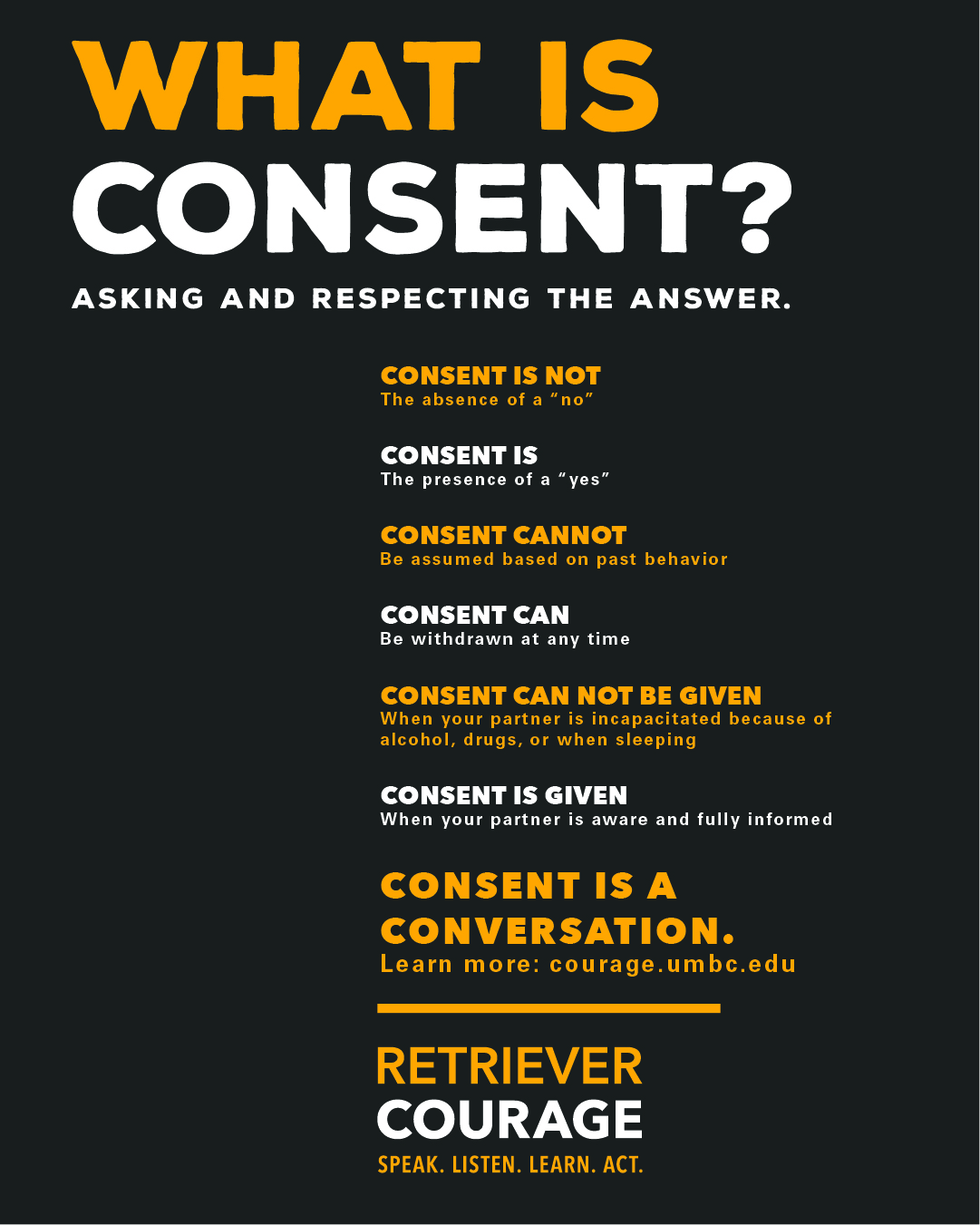Virtual Sexual Assault Awareness Month: Affirmative Consent (Week 1) Round-Up
In the absence of physical space to learn, create, and come together, the Women’s Center is taking Sexual Assault Awareness Month (SAAM) 2020 online. Each week during April, we will focus on a specific topic/theme as it relates to sexual violence awareness and prevention (see image below). Together, via out social media platforms like Facebook,Twitter, and Instagram, we can watch videos, read articles, and engage in other content for learning and skill-building.

UMBC’s Sexual Assault Awareness Month online calendar includes weekly themes to help explore important concepts related to sexual violence awareness and prevention.
But, we get it… Maybe you’re not on Facebook. Maybe you needed to take a break from social media for the day because you’re practicing self-care. Or maybe, you’re still following us on all the things and still missed a pretty cool post. That’s okay! In addition to posting on social media throughout the month, at the end of each week, we’ll provide a round-up of all the content we shared along with some action items to consider doing.
We just wrapped up week one of SAAM and spent the last several days exploring affirmative consent through the following content:
- “What is affirmative consent?”” brought to you by Retriever Courage and UMBC’s Policy on Prohibited Sexual Misconduct, Interpersonal Violence, and Other Related Misconduct.

Image is part of the Retriever Courage poster campaign. This poster focuses on what consent is and includes a list of what consent is and isn’t.
- Affirmative consent is all about saying or confirming an enthusiastic yes because YOU WANT TO… not because you feel like you have to say yes. And, being able to say yes means learning how to say no. We can learn how to create boundaries and say “no” way before we are even thinking about consent in terms of sex and it starts with educating little kids. Everyday Feminism has a great graphic to illustrate this point.

Image Reads: Children are told that adults are owed their attention and affection. When that idea is internalized it can be difficult to accept that no one is owed physical contact or emotional safety.
- Knowing what you want and don’t want is a key part of being able to participate in affirmative consent. Reviewing and completing a sexual inventory can be a great way for you to identify what you want and don’t want as a first step in being able to communicate your needs. Check out this Yes, No, Maybe list from Scarleteen.
- In this time of distance learning, Zoom meetings, and FaceTime as some of our only means of socially connecting with classmates, co-workers, family and friends, it’s even more important to be thinking about digital consent and practicing clear communication. Learn more here.
Important Take-Away:
→ Affirmative consent is not just about the presence of a no… it is the presence of an enthusiastic yes!
→ Remember FRIES.… consent is: Freely given, Reversible, Informed, Enthusiastic and Specific.

Now that you’ve got some good readings in your tool kit, what will you do with them? Here’s some Action Items:
- Incorporate at least one way you can ask or give consent into your daily life, whether that’s asking to hug someone if you haven’t asked in the past, talking to your friends about tagging you on social media only after they’ve asked you, or offering an alternative way for a young person in your life to show gratitude that isn’t connected to physical touch or affection.
- Share one of the articles above on your social media platforms. Ask your friends or family member if they’d be willing to engage in a conversation with you about one of the takeaways that stood out to you.
- Like tea? Then here’s one more video on consent you can watch and share!
Follow the Women’s Center on myUMBC, Facebook, Twitter, and Instagram for SAAM updates and information throughout the month of April. You can also stay up-to-date by following #UMBCsaam
Throughout this time of distance learning, campus staff are still here and available for support. Do not hesitate to reach out for questions, concerns, or care.
On-Campus Resources Available for Virtual Support:
-
Visit Retriever Courage for a full list of campus resources and support to include resources for USG students, faculty, and staff
-
For up-to-date details on how to access these resources during this time of distance learning visit UMBC’s COVID-19 resources page.
To report a complaint of sexual misconduct or discrimination, please submit this online form.
Posted: April 6, 2020, 3:32 PM